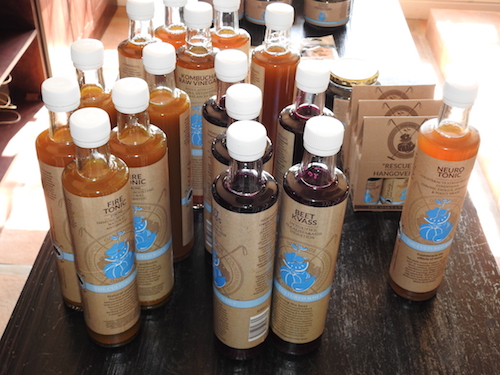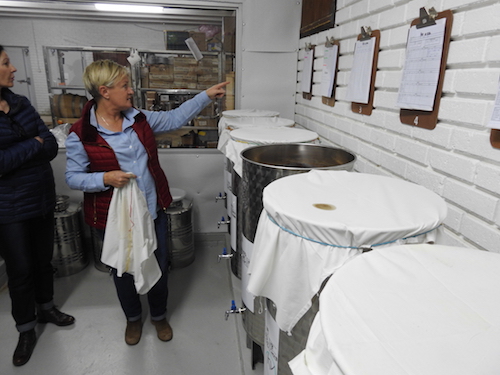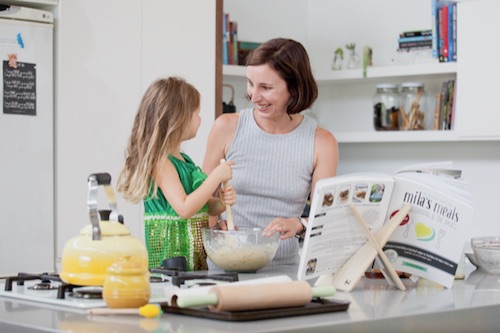 When the barman lines up shot glasses in the snug little bar at Oaklands Country Manor, I suspect I’m in for a treat.
When the barman lines up shot glasses in the snug little bar at Oaklands Country Manor, I suspect I’m in for a treat.
He pours from a slender bottle labelled Fire Tonic, and the smell hits me first – not the bracing whiff of spirits, but an eye-watering brew of ginger, garlic, vinegar and chilli. It’s my gut that’s getting a treat, because this is a fermented drink alive with probiotics to boost your immune system and act as a natural antibiotic against infections.
The Fire Tonic appears again at breakfast, along with Beet Kvass and Kombucha Vinegar, more probiotic tonics to rebalance your gut before you fill it with homemade muesli, pastries and free-range ham and eggs.
Oaklands Country Manor near Van Reenen in the Drakensberg is owned by sisters Caroline, Kathy and Annie and their brother Simon Tully, and they’ve created a thriving business with their tonics, medicinal herbs and organic food. “In the old days, food contained all sorts of beneficial elements that made our bodies robust, but now the goodness is sterilised out of it,” explains Kathy, the chef.
 Kathy and her sisters began experimenting with fermented foods after modern medicine failed to cure Caroline’s leaky gut, where a damaged small intestine allows undigested food and bacteria to leak into the blood stream. Now they’re running a thriving industry, with a former stable turned into a warm and pungent-smelling fermenting room.
Kathy and her sisters began experimenting with fermented foods after modern medicine failed to cure Caroline’s leaky gut, where a damaged small intestine allows undigested food and bacteria to leak into the blood stream. Now they’re running a thriving industry, with a former stable turned into a warm and pungent-smelling fermenting room.
It’s full of steel churns, some brewing kombucha vinegar, made from black tea leaves, whey, spring water and organic brown sugar, which promises to fight viral, bacterial, parasitic and fungal diseases and encourage blood circulation. Other vats are fermenting beetroot kvass, a tonic for the liver and kidneys. Old-style bread is also on the menu, made by fermenting stoneground flour with a yogurt culture for 48 hours. That breaks down parts of the grain and makes it easier to digest.
 A return to the natural process of fermentation started to trend about a decade ago, and health shops are now bursting with kombucha drinks, fermented breads, sauerkraut and other fermented vegetables. It’s easy to make them at home, too.
A return to the natural process of fermentation started to trend about a decade ago, and health shops are now bursting with kombucha drinks, fermented breads, sauerkraut and other fermented vegetables. It’s easy to make them at home, too.
The starting point is a festering, slimy mass called a Scoby, a Symbiotic Culture Of Bacteria and Yeast, which you can buy or make yourself, by adding a bottle of raw kombucha to black tea and sugar.
Once your scoby is wobbling away, you can add it to green or black tea to create your own kombucha, a tangy, fizzy drink bubbling with probiotics, organic acids, antioxidants, digestive enzymes, vitamins and micronutrients.
The science behind it is simple: we digest food when the natural bacteria in our gut breaks it down through fermentation. Since fermented foods are already bursting with these ‘happy bacteria’, it’s like sending in additional troops to boost your existing army. The result is a stronger immune system, better absorption of the nutrients in food, and a dose of natural antibiotics.
 There’s plenty scientific evidence to justify the trend, with the US-based Physicians Committee for Responsible Medicine (PCRM) saying fermented foods “directly inoculate your gut with healthy live micro-organisms that crowd out unhealthy bacteria, improve the absorption of minerals, and improve overall health.” They also decrease allergies, reduce the risk of colon cancer, treat diarrhoea and may help to prevent type 2 diabetes, high cholesterol and mood disorders, the PCRM believes.
There’s plenty scientific evidence to justify the trend, with the US-based Physicians Committee for Responsible Medicine (PCRM) saying fermented foods “directly inoculate your gut with healthy live micro-organisms that crowd out unhealthy bacteria, improve the absorption of minerals, and improve overall health.” They also decrease allergies, reduce the risk of colon cancer, treat diarrhoea and may help to prevent type 2 diabetes, high cholesterol and mood disorders, the PCRM believes.
These ‘happy bacteria’ are well named too, with growing evidence that a healthy gut also boosts your mental wellbeing. Psychiatrist Ted Dinan of the University of Cork in Ireland believes the organisms in foods like yogurt, sauerkraut and kimchi may alleviate psychiatric illnesses, and he’s assessing their ability to treat depression and behavioural issues like Attention Deficit Disorder.
 “Fermented foods are powerful magic,” agrees Catherine Barnhoorn, an Integrative Nutrition Health Coach in Cape Town. She healed herself from endometriosis, Candida, leaky gut and severe eczema through her diet, and wrote a recipe book called Mila’s Meals after her daughter Mila reacted badly to the same modern foods as she did. “Food can be the best form of medicine or the slowest form of poison,” she says. “We have all these modern day illnesses and lifestyle diseases because we wipe out our gut bacteria with antibiotics and sugar, so this resurgence in fermented food is fantastic. My whole proposition is using food as medicine, and fermented foods are some of the best medicines.”
“Fermented foods are powerful magic,” agrees Catherine Barnhoorn, an Integrative Nutrition Health Coach in Cape Town. She healed herself from endometriosis, Candida, leaky gut and severe eczema through her diet, and wrote a recipe book called Mila’s Meals after her daughter Mila reacted badly to the same modern foods as she did. “Food can be the best form of medicine or the slowest form of poison,” she says. “We have all these modern day illnesses and lifestyle diseases because we wipe out our gut bacteria with antibiotics and sugar, so this resurgence in fermented food is fantastic. My whole proposition is using food as medicine, and fermented foods are some of the best medicines.”
One caveat of course is that rather sad rule of life: moderation. Dishing up sauerkraut, kimchi and fermented vegetables at every meal and washing them down with kombucha could cause an imbalance of happy bacteria that’s as unwelcome as a bad bug imbalance. Fermented foods are high in histamine, so for people with a histamine intolerance they may cause bloating, gas, diarrhoea, cramps or itchy skin.
“Any medicine can be poison — it’s always possible to have too much of a good thing. But a lack of living fermented foods in one’s diet would have more of a downside than the risk of occasional overindulgence,’ says Meghan Werner. She’s the founder of Theonista, which ferments kombucha in Woodstock, Cape Town. Meghan reckons that 200-500ml of kombucha is a good amount to drink each day.
“While kombucha is not a cure-all, it’s definitely one of the most compellingly beneficial foods I’ve ever come across,” she says. “The key is to listen to your body. There’s no magical precise amount that’s going work for everyone.”
Make your own sauerkraut:
Sauerkraut is one of the easiest and cheapest ways to nourish your gut, body and brain, says Catherine Barnhoorn, author of a recipe book for her daughter, Mila’s Meals.
Ingredients:
1 tsp. cumin seeds
1 tsp. caraway seeds
1⁄2 cup filtered water
1 cabbage, shredded (save one big leaf)
1 tablespoon of ground sea salt.
Method:
Soak the seeds in 1⁄2 cup of filtered water. Shred the cabbage into a large bowl, sprinkle with salt and massage for 10 minutes to release the juice. Mix in the seeds. Transfer to sterilised glass jars and pound down to release any air bubbles. If the cabbage is not submerged in its own juice, add some of the seed-soaking water or filtered water.
Place the big cabbage leaf over the shredded cabbage to hold it down. Put the lid on and leave in a cool, dark cupboard. Every day for three days open the jars and pound down the cabbage again. Leave in a cupboard for 10 days to ferment. After 10 days your sauerkraut is ready. Sauerkraut, like most of these well-cultured foods, will last for several months in a fridge without any spoilage.
For more recipes from Catherine Barnhoorn see here:
For details of Oaklands Country Manor, see here:
For details of Theonista’s fermented drinks, including Ginger Rooibos kombucha, see here: